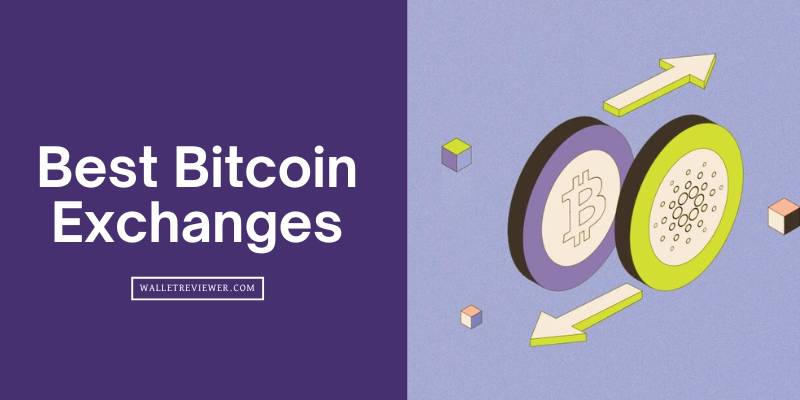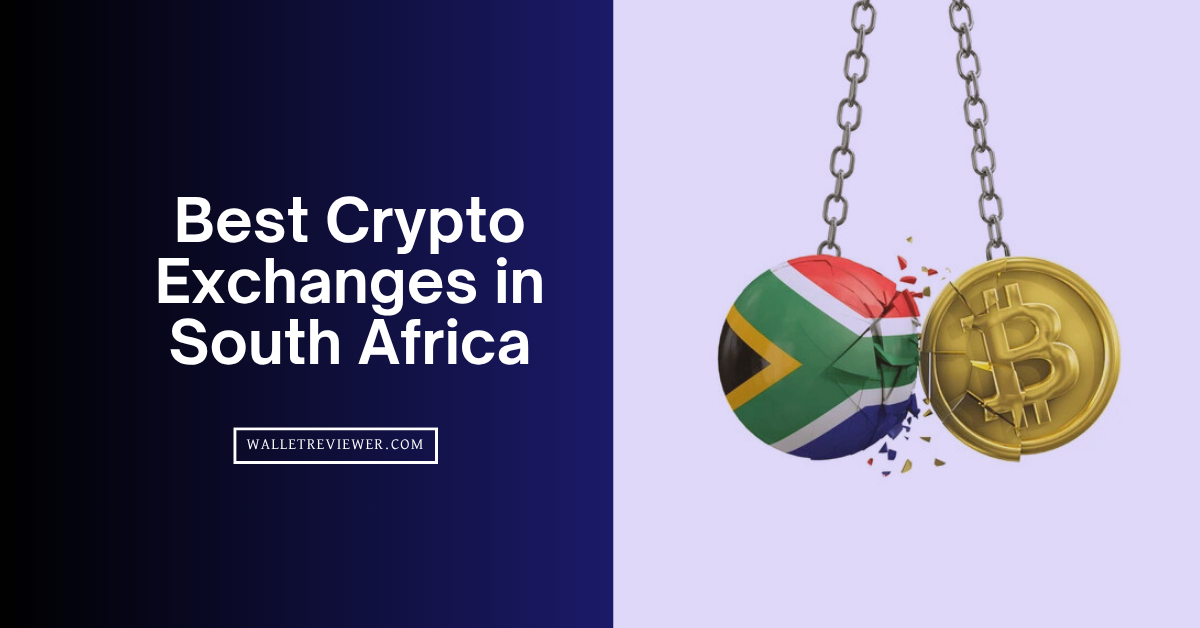Finding the best Bitcoin exchange isn’t easy with so many options out there. Some charge high fees, others have bad security, and a few just don’t work well for beginners.
I took time to compare the top Bitcoin trading platforms based on real things that matter, like trading fees, security, supported coins, ease of use, and withdrawal limits. I didn’t just rely on reviews; I checked their official websites, tested the platforms, and looked at what real traders are saying.
This guide includes trusted and best exchanges for Bitcoin trading and storage that are safe, fast, and beginner-friendly.
Best Bitcoin and Crypto Exchanges: 8 Top Picks
- Bitget: Best Bitcoin exchange for beginners
- MEXC: Best exchange for no-KYC traders
- KuCoin: Best for trading altcoins
- Binance: Best for high-volume traders
- Bybit: Best for derivatives trading
- Gate.io: Best for futures trading
- Coinbase: Best Bitcoin investment site for U.S. users
- HTX: Best for buying low-cap altcoins
Best Bitcoin Exchanges & Places to Buy BTC in 2026
My Recommendation: 2 top Bitcoin & crypto exchanges (overall best in everything):
Most Secure Bitcoin Trading Platforms for 2026 (Reviewed)
Here is an in-depth review of the 8 best crypto exchanges to buy Bitcoin and altcoins securely:
1. Bitget: Best Bitcoin exchange for beginners
| Our ranking | #1 |
| Regulated and Licensed | Yes (Poland, El Salvador, USA, and Lithuania) |
| Insurance | Yes ($600M protection fund) |
| Supported coins | 700+ cryptocurrencies |
| Trading fees | Spot: 0.1% maker/taker (20% off with BGB). Futures: 0.02% maker, 0.06% taker |
| Features | Copy trading, automated trading bots, spot and futures trading, |
| Maximum leverage | Up to 125x for futures contracts (varies by asset) |
| Trading volume and liquidity | Over $10 billion USDT (24-hour); strong altcoin liquidity |
| Payment methods | Credit/Debit card (Visa, Mastercard), Bank Transfer, Apple Pay |
| Minimum deposit | $1 USD |
| KYC Required | Yes (Mandatory) |
| Withdrawal limits | $6 million for regular users (increases with KYC levels) |
Why Is Bitget the Best BTC Exchange?

Bitget is a global cryptocurrency exchange that’s been around since 2018. It’s become quite popular, especially for its strong focus on derivatives trading and copy trading features. They’ve grown to serve over 120 million users across more than 150 countries.
Bitget offers a wide range of cryptocurrencies, with over 700 tokens listed for spot trading, as well as 500+ futures contracts. They have competitive fees, with standard spot trading fees at 0.1% for both makers and takers, and can be reduced if you use their native token, BGB. For futures, maker fees start at 0.02% and taker fees at 0.06%.
Bitget prioritizes security through the segregation of cold and hot wallets, as well as multi-signature authorizations, to safeguard user funds. They also hold regulatory licenses in several regions like the USA, Canada, and Australia, and are registered as a VASP in Poland. Their 24-hour trading volume often surpasses $10 billion USDT, and a recent CoinGecko report even highlighted them as a leader in altcoin liquidity.
Note: Use our Bitget referral code “BIT100” during registration to unlock $6,200 sign-up bonus and get a 20% trading fee discount for life.
2. MEXC: Best exchange for no-KYC trading
| Our ranking | #2 |
| Insurance | $100 Million Guardian Fund |
| Supported coins | Over 2,900 cryptocurrencies. |
| Trading fees | Spot trading: 0% maker, 0.02% taker Futures trading: 0% maker, 0.01% taker |
| Features | Spot trading, futures trading (USDT-M and COIN-M), staking, lending |
| Maximum leverage | Up to 200x on futures trading. |
| Trading volume and liquidity | Over $4.1 billion |
| Payment methods | Fiat-to-crypto purchases via third-party partners using Visa and Mastercard. |
| Minimum deposit | $1 |
| KYC Required | No (Trade with just an email) |
| Withdrawal limits | No-KYC: 10 BTC per 24 hours. Primary KYC: up to 80 BTC. Advanced KYC: up to 200 BTC. Institutional KYC: up to 400 BTC. |
Why is mEXC the Best BTC Exchange?

MEXC, which started in 2018, has become quite popular, serving over 40 million users across more than 170 countries. A big reason people choose MEXC is its flexibility regarding “Know Your Customer” (KYC) verification.
It is one of the best no-KYC crypto exchanges. You can actually start trading spot and even futures on MEXC without immediately going through the full identity verification process. This makes it a go-to choice for traders who value their privacy or just want a quicker setup.
MEXC is also known for its wide selection of trending tokens, they’ve been listing a lot of new ones, and the trading volume for these new listings has seen significant growth. Plus, their trading fees are pretty competitive, with 0% maker fees on spot and futures, which is a big draw for active traders. (Read my MEXC review)
Note: Use our MEXC referral code “mexc-1b9QM” during registration to unlock $1,000 sign-up bonus and get a 30% trading fee discount.
3. KuCoin: Best for trading altcoins
| Our Ranking | #3 |
| Licensed | FIU India and Europe |
| Insurance | Yes (amount not publicly disclosed) |
| Supported Coins | 900+ cryptocurrencies. |
| Trading Fees | Spot: 0.1% (maker/taker); 20% KCS discount Futures: 0.02% maker and 0.05% taker |
| Features | Spot trading, Margin trading, Futures trading, Trading Bot |
| Maximum Leverage | Up to 100x on futures for some pairs. |
| Trading Volume & Liquidity | $5.87 billion per day |
| Payment Methods | Credit/debit card, P2P trading, bank transfers |
| Minimum Deposit | As little as $1 |
| KYC Required | Yes (Mandatory) |
| Withdrawal Limits | 1 BTC daily for KYC-1 users |
Why is KuCoin the Best Exchange?

KuCoin is the best Bitcoin exchange that’s been around since 2017. It’s known as a “people’s exchange” because it offers a really wide variety of cryptocurrencies, especially a lot of smaller, newer altcoins that you might not find elsewhere.
They claim to have over 30 million users globally across more than 200 countries. KuCoin supports trading for over 900 coins, which is a big number compared to many other exchanges.
Their trading fees are generally considered low, starting at 0.1% for spot trading, and you can even get discounts if you pay with their native token, KCS. They offer various trading options like spot, margin, futures, and a trading bot for automated strategies. KuCoin also has its own Web3 wallet for managing assets and exploring decentralized applications (DApps).
Note: Use our KuCoin referral code “QBSSSFC3” during registration to unlock $11,000 welcome bonus and get a 20% trading fee off.
4. Binance: Best for high-volume Bitcoin traders
| Our Ranking | #4 |
| Licensed | Yes (Europe, Asia, the Middle East, and the Americas) |
| Insurance | $1 billion Secure Asset Fund for Users (SAFU) |
| Supported Coins | 500+ crypto tokens |
| Trading Fees | Spot: 0.1% or lower Futures: 0.02% maker and 0.05% taker |
| Features | Spot trading, futures, margin trading, staking, Launchpad |
| Maximum Leverage | Up to 125x |
| Trading Volume | Over $20 billion per day |
| Payment Methods | Bank transfer, debit/credit card, P2P |
| Minimum Deposit | $10 USD |
| KYC Required | Yes, mandatory |
| Withdrawal Limits | $8 million for regular users |
Why is Binance the Best crypto Exchange?

Binance is a really big name in the crypto world, probably the largest cryptocurrency exchange out there by trading volume. It was started in 2017 by Changpeng Zhao, also known as CZ.
Right from the start, Binance aimed to be a fast and easy-to-use platform for trading digital currencies. They actually raised about $15 million through an Initial Coin Offering (ICO) when they first launched, which helped them grow super quickly.
Today, Binance is used by a huge number of people, with over 275 million users globally. They handle a massive amount of trades every day across hundreds of different cryptocurrencies. One of the main reasons crypto traders use Binance is for its low trading fees, which usually start around 0.1% and can even go lower if you use their own coin, BNB. Beyond just buying and selling, Binance has grown into a full ecosystem with things like a blockchain (BNB Chain), a wallet, and even educational resources.
Note: Use our Binance referral code “KNQRCYIH” during registration to unlock $100 welcome bonus and get a 10% trading fee off.
5. Bybit: Best for Bitcoin derivatives trading
| Our Ranking | #5 |
| Licensed | Canada and Kazakhstan, and custody in Cyprus |
| Insurance | Yes (amount not disclosed) |
| Supported Coins | Supports over 1,280 cryptocurrencies |
| Trading Fees | Spot trading: 0.1 maker/taker Futures: 0.2% maker and 0.55% taker |
| Features | Spot trading, derivatives (futures, perpetuals), options, and copy trading |
| Maximum Leverage | Up to 100x on perpetual futures |
| Trading Volume and Liquidity | $15 billion USD. |
| Payment Methods | Bank cards (Visa, Mastercard, JCB), Google Pay, Apple Pay |
| Minimum Deposit | $10 |
| KYC Required | Yes (for trading) |
| Withdrawal Limits | Non-KYC: 20,000 USDT equivalent daily, 100,000 USDT equivalent monthly. KYC users have much higher limits. |
Why is Bybit the Best Bitcoin Exchange?

Bybit has become a well-known name in the crypto exchange world since it started in 2018. It’s especially popular for derivatives trading, like futures and perpetual contracts, and often ranks in the top 10 globally for these.
Bybit focuses on providing a fast and efficient trading experience, handling up to 100,000 transactions per second. They’ve built a solid reputation for security, using cold storage for most user funds and requiring two-factor authentication.
While they initially focused on crypto-to-crypto trading, Bybit has expanded to allow fiat currency deposits in several currencies, making it more accessible. They also offer a testnet platform, which is great for new traders to practice without real money, and have a wide range of educational materials available.
Note: Use our Bybit referral code “OKCRYPTO” during registration to unlock $30,000 welcome bonus and get a 20% trading fee off.
6. Gate.io: Best for futures trading
| Our ranking | #6 |
| Licensed | Yes (Malta, Australia, Hong Kong, Dubai, Bahamas) |
| Insurance | 128% PoR |
| Supported coins | Over 3,800 cryptocurrencies |
| Trading fees | Spot trading: 0.2% flat for maker/taker Futures trading: 0.020% maker, 0.050% taker |
| Features | Spot and futures trading, margin trading, trading bots, staking, crypto loans |
| Maximum leverage | Up to 100x on futures |
| Trading volume and liquidity | $2.75 billion |
| Payment methods | Debit/credit card, bank transfer |
| KYC Required | Yes |
| Withdrawal limits | KYC1: up to $2 million USDT equivalent KYC2: up to $5 million USDT equivalent |
Why is Gate.io the Best Bitcoin Platform?
Gate.io has been around since 2013, making it one of the older Bitcoin exchanges in the market. It’s known for offering a huge variety of digital assets, with over 3,800 cryptocurrencies available for trading, which is more than many competitors.
Its 24-hour trading volume was about $2.75 billion, showing it’s a pretty active platform. Gate.io operates globally, serving users in over 130 countries, though it’s restricted in places like the United States and Canada due to local rules.
They’ve been focusing on transparency, even releasing a Proof of Reserves audit. Recently, their total reserves were reported at $10.328 billion with a 128.58% reserve ratio, which means user assets are well-backed.
They offer various trading options like spot trading, futures, staking, and even crypto loans, aiming to provide a wide range of services for both new and experienced traders.
Note: Use our Gate.io referral code “OKCRYPTO” during registration to unlock $6,666 welcome bonus and get a 30% trading fee off.
7. Coinbase: Best Bitcoin investment site for U.S. users
| Our Ranking | #7 |
| Licensed | Yes (US and Europe) |
| Insurance | $250,000 per depositor (only fiat money) |
| Supported Coins | Over 250 cryptocurrencies |
| Trading Fees | 0.4% maker and 0.6% taker (up to 3.99% for fiat purchases) |
| Features | Easy buy/sell, staking, Coinbase Card, NFT marketplace. |
| Maximum Leverage | Up to 10x on perpetual futures |
| Trading Volume | over $15 billion |
| Payment Methods | Bank account (ACH), wire transfer, debit card, PayPal for deposits Withdrawals to bank account (ACH, wire), PayPal. |
| Minimum Deposit | $1 |
| KYC Required | Yes |
Why is Coinbase the Best and Most Secure Bitcoin Exchange?

Coinbase is one of the biggest and most well-known crypto exchanges globally, and it’s particularly popular in the U.S. It started back in 2012 and has since grown to serve over 100 million users.
What makes it a go-to for many, especially beginners, is its user-friendly platform that simplifies buying, selling, and managing cryptocurrencies like Bitcoin and Ethereum. While it supports more than 250 different cryptocurrencies, it might not have every single obscure coin out there.
Coinbase also offers a “Coinbase Advanced Trade” platform for more experienced users, providing deeper trading tools and charting features. They emphasize security with measures like two-factor authentication and storing most customer assets in cold storage, which means offline.
8. HTX: Best for buying Bitcoin along with Alts
| Our ranking | #8 |
| Insurance | Proof of Reserves, continuously above 100% |
| Supported coins | Over 1,700 cryptocurrencies |
| Trading fees | Base 0.2% maker and taker fees; discounts with HTX token |
| Features | Spot trading, futures, margin trading, trading bots, mobile app |
| Maximum leverage | Up to 200x for crypto futures, 5x for cross margin |
| Trading volume and liquidity | Over $4 billion daily trading volume (as of recent data) |
| Payment methods | Credit/debit cards, bank transfers, crypto deposits, Alipay, WeChat Pay |
| KYC Required | Yes |
| Withdrawal limits | 5 BTC daily |
Why is HTX the Best Bitcoin Platform?

HTX, which was formerly known as Huobi Global, is a well-established Bitcoin exchange that started back in 2013. It’s grown quite a bit since then and is now considered one of the larger global exchanges, serving over 50 million users.
They really focus on providing a wide variety of digital assets for trading, with over 1,700 cryptocurrencies available. This includes popular ones like Bitcoin (BTC), Ethereum (ETH), and USDT.
HTX offers competitive trading fees, which can be further reduced if you hold their native token, HTX. They also emphasize security, using measures like two-factor authentication and keeping a good portion of user assets in cold storage. Recently, HTX reported a 92% increase in new users, and their total platform assets went over $6.4 billion.
Note: Use our HTX referral code “bnmtb223” during registration to unlock $1,500 welcome bonus and get a 10% trading fee off.
Top 8 Bitcoin Exchanges Compared
| Exchange | Buy/Sell Bitcoin | Bitcoin Futures Trading | BTC Fees (Spot Trading) | Licensed |
| Bitget | Yes | Yes | Maker 0.1%, Taker 0.1% | Yes |
| MEXC | Yes | Yes | Maker 0%, Taker 0.02% | No (because no-KYC) |
| KuCoin | Yes | Yes | Maker 0.1%, Taker 0.1% | Yes |
| Binance | Yes | Yes | Maker 0.1%, Taker 0.1% | Yes (Highly regulated) |
| Bybit | Yes | Yes | Maker 0.01%, Taker 0.06% | Yes |
| Gate.io | Yes | Yes | Maker 0.2%, Taker 0.2% | Limited |
| Coinbase | Yes | No | Varies (e.g., 0.6% maker/taker for advanced) | Yes, fully licensed in the U.S. |
| HTX | Yes | Yes | Maker 0.2%, Taker 0.2% | Limited |
How to Choose the Best Bitcoin Trading Site?
- Security Measures: You need to make sure the exchange has strong security like two-factor authentication (2FA) for logging in and ideally keeps most user funds in “cold storage,” which means offline and away from internet hackers. Also, check if they have a good track record and haven’t had major hacks in the past. Your money needs to be safe.
- Fees and Costs: The best Bitcoin exchanges charge different fees for trading, depositing, and withdrawing money. These fees can really add up, especially if you trade often. Look for a clear fee structure and compare it across different platforms. Sometimes, an exchange might have slightly higher fees but offers better security or features that make it worthwhile.
- Supported Cryptocurrencies: While you’re mainly focused on Bitcoin, you might want to trade other cryptocurrencies in the future. Check if the exchange offers a good variety of coins. If it only lists a few, that might limit your options later on.
- Liquidity and Trading Volume: A good exchange should have high trading volume and liquidity. This means there are always enough buyers and sellers, so you can easily buy or sell your Bitcoin at a fair price without big delays or price changes. High liquidity generally means your trades will go through quickly.
- User-Friendliness and Features: Think about how easy the platform is to use, especially if you’re new to crypto. Does it have a clean, intuitive interface? Is there a good mobile app? Some exchanges also offer extra features like advanced charting tools, margin trading, or even ways to earn interest on your crypto, which might be helpful as you get more experienced.
- Customer Support: If you ever run into a problem or have a question, good customer support is crucial. Look for exchanges that offer responsive support through multiple channels, like live chat, email, or phone. It’s good to know you can get help when you need it.
Read: Lowest fee crypto exchanges
What is a Bitcoin Exchange?
The Bitcoin exchange is an online marketplace where you can buy, sell, or trade BTC and other cryptocurrencies. It’s kind of like a foreign exchange office or a stockbroker, but specifically for digital money.
Instead of exchanging US dollars for Euros, you’re exchanging your regular money (like rupees, dollars, or euros) for Bitcoin, or even trading one cryptocurrency for another, like Bitcoin for Ethereum. These platforms match buyers with sellers, making the whole process of getting into crypto much easier.
Related: Safest crypto exchanges
How to Use a Bitcoin Exchange?
- Sign Up and Verify: First, you create an account, just like with any other online service. Most secure best Bitcoin exchanges will ask you to verify your identity. This is called KYC (Know Your Customer) and usually involves providing a photo ID and proof of address. They do this to prevent fraud and follow financial regulations.
- Deposit Funds: Once your account is set up, you need to put money into it. You can usually do this by linking your bank account, using a debit or credit card, or by sending cryptocurrencies from another wallet.
- Place an Order: Now you’re ready to trade. You decide if you want to buy or sell Bitcoin. You’ll typically place an “order,” specifying how much Bitcoin you want and at what price. For example, you might place a “market order” to buy Bitcoin at its current best available price, or a “limit order” to buy it only when it reaches a specific price you set.
- Order Matching: The exchange then takes your order and tries to find a matching order from another user. If you want to buy Bitcoin, it looks for someone who wants to sell it at your desired price. This process happens very quickly, often in milliseconds.
- Trade Execution: Once a match is found, the trade is completed, or “executed.” The Bitcoin goes into your exchange wallet, and your regular money (or other crypto) is exchanged.
- Withdrawal: After you’ve bought Bitcoin, you can either keep it on the cryptocurrency exchange or, for better security, withdraw it to your own personal crypto wallet, which you fully control.
To store BTC, check out our guide on the best Bitcoin wallets.
Centralized vs. Decentralized Bitcoin Exchanges
Now, there are two main types of Bitcoin exchanges, and they handle your money and trades quite differently.
| Feature | Centralized Bitcoin Exchanges (CEX) | Decentralized Bitcoin Exchanges (DEX) |
| Control of Funds | Exchange holds your funds. | You control your funds directly. |
| Security Risk | Higher hack risk for the exchange itself. | Lower large-scale hack risk. |
| User Anonymity | Low; KYC is usually required. | Higher; often no ID needed. |
| Speed & Efficiency | Generally faster. | Can be slower (blockchain transactions). |
| Ease of Use | More user-friendly for beginners. | More complex; needs wallet understanding. |
| Asset Availability | Wide range of coins. | Limited to specific blockchain tokens. |
| Trading Fees | Specific trading and withdrawal fees. | Mainly pay network “gas fees.” |
| Liquidity | Higher liquidity. | Generally lower liquidity. |
| Regulation | Often heavily regulated. | Less regulated. |
| Customer Support | Provides customer support. | Limited or no central support. |
Related: Best altcoin exchanges
FAQs: Top Crypto Exchanges for Bitcoin
What is the best Bitcoin exchange in 2026?
Bitget is the best Bitcoin exchange in 2026. It gains popularity for its comprehensive trading features, including spot and derivatives trading, and its focus on social trading through copy trading.
Bitget also offers a wide array of cryptocurrencies and competitive fees, making it attractive for both new and experienced traders. Its strong security measures and continuous platform improvements contribute to its high ranking among users.
Which Bitcoin exchange has the lowest fees?
MEXC often offers some of the lowest fees for Bitcoin trading. This exchange is known for its very competitive fee structure, frequently featuring 0% maker fees and low taker fees, especially for high-volume traders.
Can US residents legally use Bitcoin trading sites?
Yes, US residents can legally use Bitcoin trading sites. However, legality depends on the specific exchange and the state where the resident lives.
Many global exchanges do not operate in all US states due to varying state-level regulations. MEXC is best for no-KYC and Coinbase is best for regulated trading.
Are Bitcoin exchanges safe to use?
The best Bitcoin exchanges are safe to use, but safety varies significantly between platforms. Most reputable exchanges implement strong security measures like two-factor authentication, cold storage for funds, and regular security audits. They also often have insurance policies to protect user assets against breaches.
Can I buy Bitcoin with a credit card on these exchanges?
Yes, you can generally buy Bitcoin with a credit card on many exchanges. Most major platforms offer credit and debit card payments as a convenient way to deposit funds and purchase cryptocurrencies.
Do I need KYC to use a Bitcoin exchange?
Yes, you typically need KYC (Know Your Customer) to use the best Bitcoin exchange. This identity verification process is a standard requirement for most regulated exchanges globally.
KYC helps prevent money laundering and fraud. While some platforms might allow limited activity without full KYC, you will usually need to complete it for higher deposit limits, withdrawals, and full access to services.
What payment methods do Bitcoin investment sites accept?
Bitcoin investment sites accept various payment methods. Common options include bank transfers (like wire transfers or ACH in the US, SEPA in Europe), debit and credit cards, and cryptocurrency deposits from other wallets.
Some platforms also support e-wallets or peer-to-peer (P2P) transactions, offering flexibility for users worldwide to fund their accounts.
Can I trade Bitcoin derivatives on these exchanges?
Yes, you can trade Bitcoin derivatives on many exchanges. Derivatives are financial contracts whose value comes from an underlying asset, like Bitcoin. Common types include futures contracts, options, and perpetual swaps.
What are maker and taker fees on Bitcoin exchanges?
Maker and taker fees are common trading fees on the best Bitcoin exchanges. A “maker” places an order that adds liquidity to the order book, like a limit order that doesn’t execute immediately. They usually pay lower fees, or even receive rebates.
A “taker” places an order that immediately removes liquidity from the order book, like a market order. Takers typically pay higher fees
Which Bitcoin exchange supports the most cryptocurrencies?
MEXC, Gate.io, and HTX support a very large number of cryptocurrencies. These exchanges are known for offering an extensive selection of digital assets, often listing hundreds or even over a thousand different coins and tokens.
Is it better to store Bitcoin on an exchange or in a wallet?
It is generally better to store Bitcoin in your own wallet for long-term holding. Keeping Bitcoin on an exchange means the exchange controls your private keys, exposing your funds to potential exchange hacks or operational issues.
Storing Bitcoin in a personal wallet (like a hardware or software wallet) gives you full control and reduces counterparty risk, enhancing security
Are these best Bitcoin exchanges regulated?
Yes, Bitcoin exchanges are increasingly regulated. The level and type of regulation vary significantly by country and jurisdiction. Many countries have introduced specific licenses and compliance requirements for crypto exchanges, focusing on anti-money laundering (AML) and know-your-customer (KYC) policies.
Can I earn passive income on Bitcoin or crypto exchanges?
Yes, you can earn passive income on some Bitcoin exchanges. Many crypto trading platforms offer features like staking, where you lock up your crypto to support network operations and earn rewards.
Other options include lending your crypto to borrowers for interest, or participating in savings accounts that offer yields.
Read More: How to buy crypto under 18
Related: Best crypto sign-up bonus



